Key Takeaways
Before launching an astrology app, ensure it complies with Apple’s guidelines on privacy, subscriptions, and data security of users.
Technical requirements for submission are enrollment in the Apple Developer Program, build with the latest iOS SDK, and integration of Apple Pay.
Steps to launch your astrology app on the iOS Store include joining the developer program, app testing, preparing App Store assets, and ensuring privacy policy.
Common reasons for rejection are misleading claims, privacy violations, poor UX or performance, spammy content, or violation of payment rules.
Best practices for faster approval include following Apple guidelines, optimize performance, being transparent about monetization, and conducting beta testing.
Perform post-launch optimization by continuous ASO, personalized notifications, subscription updates, social media marketing, and influencer partnerships.
Hiring JPLoft brings in a decade of expertise in app development, AI integration, secure payment, and customized design to stand out in iOS market.
Launching an astrology app on the iOS Store is an exciting opportunity to bring cosmic insights to a global audience. With the growing popularity of astrology apps for daily horoscopes, personalized readings, and celestial guidance, the App Store has become a thriving marketplace. And after developing apps to become part of this booming spiritual wellness industry, you must be looking for how to launch your astrology app on iOS Store.
However, the process of getting your astrology app published goes far beyond just building it. The process requires careful planning, preparation, testing, securing user data, optimizing your listing, being transparent with monetization, and compliance with Apple’s strict guidelines. Each of these steps is crucial in ensuring your app stands out and gets approved by the iOS App Store.
In this guide on how to publish an astrology app on iOS Store, we will walk you through each stage of the launch process, including technical requirements, submission best practices, and promotional tips. Whether you are a developer, entrepreneur, or astrology enthusiast, this roadmap will help get your app listed on the top-ranking lists of apps on the App Store.
Things to Consider Before Launching an Astrology App on the iOS Store
Before launching an astrology app on the iOS Store, several important factors must be considered to ensure success and compliance with Apple’s regulations. Here are the key things to consider before starting the process to launch your astrology app on iOS store:
1. App Store Guidelines Compliance
-
Ensure your astrology app complies with App Store Review Guidelines to avoid rejection, as Apple has strict policies regarding privacy and data.
-
Pay special attention to rules on health-related claims, subscription models, and data tracking.
2. Unique Value Proposition (UVP)
-
The App Store is crowded with astrology apps. Define what makes your app stand out.
-
Add the latest astrology app trends like personalized horoscopes, AI predictions, live astrologer consultations, or advanced compatibility reports.
3. User Experience (UX) and Design
-
iOS users expect sleek, intuitive, and high-performing interfaces.
-
Incorporate easy navigation, modern typography, and visually appealing charts to build trust and engagement.
4. Data Privacy and Security
-
Many astrology apps collect birth details, location, and personal information, which requires strict astrology app security.
-
Ensure GDPR and Apple’s App Tracking Transparency compliance with clear consent policies and encryption for sensitive data.
5. Performance and Compatibility
-
Test thoroughly across different iPhone and iPad models.
-
Optimize loading times for features like real-time charts and push notifications.
6. Marketing and ASO (App Store Optimization)
-
Craft a compelling app title, keywords, description, and screenshots.
-
Use videos and testimonials to increase trust and downloads.
7. Astrological Credibility
-
Partner with certified astrologers or ensure accuracy in algorithms.
-
Misinformation can quickly lead to bad reviews and app deletions.
8. Continuous Updates and Support
-
Plan a roadmap for regular updates (new zodiac insights, UI improvements).
-
Offer customer support channels for users with subscription or login issues.
Carefully addressing these considerations maximizes the chances of iOS Store approval and long-term app success in the competitive market.
Let’s explore the essential technical requirements you must fulfill for a successful submission before getting to how to get your astrology app approved on iOS Store.
To submit an astrology app on the iOS App Store in 2025, developers must meet Apple’s technical requirements alongside astrology-specific best practices.
How to Get Your Astrology App Approved On iOS Store?
Below are the technical requirements for submitting an astrology app on the iOS App Store:
1] Apple Development Account
-
You must enroll in the Apple Developer Program, which generally charges USD 99/year.
-
This gives access to App Store Connect, TestFlight, certificates, and provisioning profiles.
2] App Build and Compatibility
-
Built with Xcode (latest stable version).
-
Must target the latest iOS SDK while supporting older iOS versions.
-
Ensure Universal App support (iPhone + iPad) unless restricted to iPhone-only.
3] Performance Standards
-
Fast launch time (ideally <2 seconds).
-
Smooth rendering of charts, horoscopes, and compatibility reports without lag.
4] App Size and Optimization
-
Maximum app size for cellular download: 200 MB.
-
Use on-demand resources for heavy assets like astrological charts.
-
Optimize images (PNG/JPEG/WebP) and use vector graphics for zodiac icons.
5] App Privacy and Security
-
Implement App Tracking Transparency (ATT) if using personalized ads.
-
Privacy Policy URL is mandatory in App Store Connect to qualify for the mobile app security test.
-
Collect birth details, time, and location only with explicit consent, and encrypt them.
6] Monetization and Payments
-
Subscriptions, consultations, or horoscope reports must use Apple In-App Purchases (IAP).
-
Clearly define subscription tiers and renewal terms.
-
Free trial periods must comply with Apple’s rules.
7] Testing and QA
-
Perform astrology app testing with TestFlight with up to 10,000 beta testers.
-
Verify across:
-
Multiple devices (SE, Mini, Plus, Pro, and Pro Max).
-
iOS versions (current + previous).
-
Edge cases (like missing birth time, leap years).
8] App Store Submission Assets
-
App Name: Max 30 characters.
-
Subtitle: Max 30 characters.
-
Description: Include astrology features + USP.
-
Keywords: Max 100 characters.
-
Screenshots:
-
Mandatory for 6.7” (Pro Max), 5.5” (iPhone 8 Plus), and iPad Pro.
-
Show horoscope UI, compatibility charts, live astrologer chat (if any).
-
App Icon: 1024 × 1024 px (no transparency).
9] Push Notifications and Background Modes
-
Use APNs (Apple Push Notification service) for daily horoscope alerts.
-
Must allow users to opt in/out of notifications.
-
If the app uses location for astrology calculations, request Location Services permission with proper justification.
10] App Review Guidelines for Astrology Apps
-
Avoid misleading claims like “guaranteed future prediction.”
-
Clearly state astrology is for entertainment/lifestyle purposes.
-
Ensure age rating (12+) due to fortune-telling content.
Meeting these technical and content requirements increases the likelihood of a smooth review and successful listing on the App Store in 2025 for top astrology apps.
Let’s now briefly summarize the technical requirements while you proceed with the steps of how to launch your astrology app on the iOS store:
|
Category |
Requirements |
|
Apple Developer Account |
Enroll in Apple Developer Program ($99/year) to access App Store Connect, Xcode, and TestFlight. |
|
App Build & Compatibility |
Use the latest Xcode & iOS SDK; support recent iOS versions; optimize for iPhone & iPad models. |
|
Performance Standards |
Fast launch (<2 sec), smooth chart rendering, and offline support for daily horoscopes. |
|
App Size & Optimization |
Max 200 MB for cellular download. Use on-demand resources. Optimize images & zodiac icons. |
|
Privacy & Security |
Privacy Policy URL required; explicit consent for data. ATT compliance. Encrypt sensitive details. |
|
Monetization & Payments |
Must use Apple In-App Purchases (IAP).Transparent subscription tiers & auto-renewal terms. |
|
Testing & QA |
Test via TestFlight. check multiple devices & iOS versions. Cover edge cases (birth data, leap years). |
|
App Store Assets |
App name, subtitle, description, keywords, screenshots, preview video (optional), 1024×1024 px app icon. |
|
Notifications & Background Modes |
Use APNs for daily alerts. Allow opt-in/out. Justify Location Services if used. |
|
Review Guidelines |
Frame astrology as a lifestyle/entertainment. Age rating 12+. Avoid spammy content or unrealistic claims. |
Following structured steps on how to launch your astrology app on the iOS store ensures your app gets smoothly published and thrives in this marketplace.
Steps to Submit your Astrology App on the iOS Store
Starting an online astrology app business and launching on the iOS Store is an exciting milestone, but the submission process requires careful planning, attention to detail, and compliance with Apple’s strict guidelines. Each step plays an important role in getting your astrology app approved and how well it performs post-launch.
Below are the steps to launch your astrology app on Apple Store successfully:
Step 1. Enroll in the Apple Developer Program
Before you can publish any app, you need to be part of the Apple Developer Program. Without this membership, you won’t be able to upload your astrology app to the App Store.
-
Joining the App Developer Program costs USD 99 per year.
-
Benefits include access to App Store Connect, TestFlight, beta testing tools, certificates, identifiers, provisioning profiles, and the latest iOS SDKs.
-
Join by registering them using your Apple ID and providing the necessary personal or business details.
Step 2. Build and Test Your App Thoroughly
Apple is highly selective about the apps it approves. Build an astrology app that must not only deliver accurate predictions or daily horoscopes but also ensure a smooth, bug-free user experience.
-
Compatibility: Test across multiple iPhone and iPad models, from iPhone SE to the latest Pro Max, and ensure compatibility with the latest iOS version.
-
Performance: Your app should load horoscopes quickly, render charts smoothly, and avoid frequent crashes.
-
Edge Cases: Test scenarios like missing birth data, leap years, and incorrect time zones.
-
Beta Testing: Use TestFlight to invite testers and gather real-world feedback.
Step 3. Prepare App Store Assets
Your astrology app’s first impression on users depends heavily on its App Store listing. Apple requires specific metadata and assets, which must be accurate and high-quality. Follow these criteria from the experts' guide to launch your astrology app on Apple Store to avoid any hurdles during submission.
-
App Name: Up to 30 characters; should be unique and easy to search.
-
Subtitle: Another 30 characters to highlight your app’s USP, like “Daily Horoscopes & Zodiac Insights.”
-
Description: Provide a clear, engaging explanation of your app’s features. Avoid exaggerated claims and instead frame it as entertainment/lifestyle.
-
Keywords: Max 100 characters. Choose terms like “horoscope,” “zodiac,” “compatibility,” and “astrology.”
-
Screenshots: Required for different device sizes. Highlight key astrology app features like daily horoscopes, zodiac charts, and compatibility reports.
-
App Icon: 1024 × 1024 pixels, no transparency, simple yet memorable.
-
Preview Video (Optional): A 15–30 second video showing how the app works.
Step 4. Ensure Privacy and Data Compliance
Astrology apps often collect sensitive user information such as birth date, time, and location. Apple has strict requirements for handling such data. Failure to meet these requirements can lead to rejection.
-
Privacy Policy: A live URL is mandatory. It should explain how you collect, use, and protect data.
-
App Tracking Transparency (ATT): If your app uses personalized ads, request explicit permission from users.
-
Consent: Ensure users agree before entering personal details.
-
Security: Use encryption to protect sensitive personal data and use verified astrology API integration.
Step 5. Set Up Monetization
If your app offers premium features, reports, or live consultations, astrology app monetization is crucial.
-
In-App Purchases (IAP): All payments must go through Apple’s IAP system. External payment links are not allowed.
-
Subscription Models: Many astrology apps use freemium or subscription plans.
-
Transparency: Clearly state auto-renewal terms, free trials, and pricing in both the app and App Store description.
Step 6. Configure App in App Store Connect
Once your app is ready, you must configure its details in App Store Connect. You can hire an experienced on-demand app development company to perform these steps seamlessly. Follow these steps:
-
Log in to App Store Connect.
-
Create a new app listing and enter details like app name, description, category, and pricing.
-
Upload screenshots, icons, and a preview video.
-
Add your Privacy Policy URL.
-
Set up in-app purchases or subscriptions if applicable.
Step 7. Upload Your App via Xcode
Apple requires apps to be uploaded using Xcode, its own development environment. Once uploaded, your build will appear under the app listing in App Store Connect. Steps:
-
Open your project in Xcode.
-
Select Product → Archive to create a build.
-
Validate the build to check for errors.
-
Upload it directly to App Store Connect.
Step 8. Submit for Review
With everything configured, you’re ready to submit your astrology app. The review process typically takes 24–72 hours, but it can extend if Apple needs clarification. To upload:
-
In App Store Connect, select the uploaded build.
-
Provide additional details Apple may require, such as encryption use, contact information, and content rights.
-
Submit your app for review.
Step 9. Address Feedback (if Rejected)
It’s common for astrology apps to face rejections, especially if Apple believes the app makes misleading claims or mishandles data.
-
Check the Resolution Center in App Store Connect for rejection reasons.
-
Identify and fix the issue of rejection.
-
Resubmit the app.
-
If you strongly disagree, you can appeal Apple’s decision to the App Review Board.
Step 10. Launch and Monitor Performance
Once approved by following ways to launch your Astrology app on Apple Store, and your app goes live on the iOS App Store.
-
Monitor analytics like number of downloads, retention, and churn rate.
-
Track user reviews and respond promptly with regular astrology app maintenance.
-
Release regular updates to fix bugs, add features, and stay compliant with new iOS versions.
-
Use marketing tactics like push notifications, social sharing, and influencer collaborations to grow downloads.
Submitting an astrology app to the iOS Store is about aligning with Apple’s strict technical, design, and policy standards. By preparing thoroughly for how to launch your astrology app on iOS Store, you increase the chances of fast approval along with a foundation for long-term success.
Apple maintains strict guidelines, and many startup astrology apps fail, facing rejection during review. To avoid setbacks, it’s equally important to understand the common reasons astrology apps get rejected after knowing how to publish your astrology app on iOS Store.
Common Reasons Astrology Apps Get Rejected on the iOS Store
Astrology apps often get rejected on the iOS Store due to several recurring reasons that developers should be aware of. Here are the most common reasons why astrology app gets rejected over iOS Store, based on real-world submission cases:
► Misleading or Unverified Claims
-
Apps that make absolute predictions about health, wealth, or relationships often get flagged.
-
Apple requires astrology apps to frame content as entertainment/lifestyle, not medical or guaranteed outcomes.
► Violation of Monetization Rules
-
Using external payment gateways (PayPal, Stripe, etc.) instead of Apple’s In-App Purchases.
-
Not being transparent about subscription auto-renewals, free trials, or pricing tiers.
► Poor User Experience (UX) or Performance
-
Crashes, slow horoscope generation, or laggy charts.
-
Apps that don’t scale well on all iPhone/iPad screen sizes.
-
Broken links or blank horoscope screens lead to instant rejection.
► Spammy or Low-Quality Content
-
Copy-paste apps with template-based daily horoscopes and no unique value.
-
Too many ads, misleading pop-ups, or excessive push notifications.
-
Lack of original features like personalized charts, compatibility reports, or live consultations.
► Privacy and Data Collection
-
Collecting sensitive details without explicit consent.
-
Missing privacy policy URL in App Store Connect.
-
Not complying with App Tracking Transparency (ATT) when using personalized ads.
► Inaccurate App Store Metadata
-
Overuse of keywords in the app name/subtitle gets flagged as keyword stuffing.
-
Misleading screenshots or app descriptions that don’t reflect actual functionality.
-
No option for users to disable horoscope notifications.
► Failure to Follow App Review Guidelines
-
Missing explanation for Location Services or Push Notification permissions.
-
Using sensitive topics (like death, predicted pregnancies, gambling-style readings) results in automatic rejection.
► Cluttered or Outdated Design
-
Non-iOS-native UI of the mobile app design, which doesn’t meet Apple’s Human Interface Guidelines (HIG).
-
Poor-quality graphics or low-resolution zodiac icons.
The most successful apps developed like Co-Star and Sanctuary, position themselves as well-designed lifestyle apps, combining astrology with modern design, transparency, and community features. Ensuring originality, robust features, and full policy compliance is essential for how to get your astrology app approved on the iOS Store.
Understanding common reasons astrology apps face rejection is just the first half, knowing how to respond when it happens is the other half. So next, we will explore the actionable steps you can take if your app gets rejected.
What to do if Your Astrology App Gets Rejected?
If an astrology app gets rejected on the iOS Store, addressing the issue can increase the chances of approval on resubmission of the app. Here is a guide on how to launch an astrology app on iOS if your astrology app gets rejected on the iOS App Store:
A] Carefully Review the Rejection Message
-
Apple provides a rejection message in App Store Connect under “Resolution Center.”
-
Identify if it is a technical or policy rejection, as Apple typically specifies which guideline was violated and may include screenshots or further descriptions.
B] Fix Technical Issues Immediately
-
If the rejection cites crashes, lag, or UI errors, run detailed testing with Xcode + TestFlight.
-
Check compatibility across all supported iOS devices and iOS versions.
-
Optimize the app performance.
C] Address Policy Violations
-
Misleading Claims: Reframe astrology content as entertainment or lifestyle.
-
Privacy Issues: Add a Privacy Policy URL, request user consent before collecting personal details, and comply with App Tracking Transparency (ATT).
-
Payment Issues: Ensure subscriptions and reports run through Apple’s In-App Purchases.
D] Update Metadata and Design
-
Revise app title, description, and screenshots to match actual app features.
-
Remove keyword stuffing and unrealistic claims from the listing.
-
Ensure your astrology app design follows Apple Human Interface Guidelines.
E] Communicate with Apple
-
Use the Resolution Center to ask Apple for clarification if the rejection is unclear.
-
Provide evidence (screenshots, videos, explanations) showing how the app complies.
-
Be polite, professional, and specific in responses. This increases the chances of approval.
F] Resubmit After Fixes
-
Once issues are resolved, upload a new build via Xcode.
-
Run through TestFlight beta testing first to catch hidden bugs.
-
Double-check all submission assets (icon, screenshots, descriptions).
G] If You Strongly Disagree
-
File an appeal with Apple’s App Review Board through App Store Connect.
-
Present a clear argument, referencing Apple’s App Store Review Guidelines.
H] Plan for Future Updates
-
Maintain a compliance checklist for astrology apps (privacy, IAP, UX, content).
-
Regularly update your app to align with new iOS updates and guidelines.
-
Monitor competitor astrology apps to learn what Apple approves.
Facing rejection can feel discouraging, but it’s also an opportunity to refine your understanding of how to get your astrology app approved on the iOS Store and align it more closely with Apple’s requirements. Once you’ve addressed potential issues, the next step is knowing how to publish an astrology app on iOS Store with proven best practices to secure faster approval.
Best Practices to Get Faster Approval for Your Astrology App
To get faster approval for an astrology app on the iOS Store, follow the listed practices to align with Apple’s standards and streamline the review process. Below are the best practices to consider for launching your astrology app on iOS Store:
1] Strictly Follow Apple’s Guidelines
-
Read the App Store Review Guidelines before submission.
-
Avoid medical, financial, or “guaranteed outcome” claims. Position your astrology app as entertainment/lifestyle.
-
Ensure the app meets Human Interface Guidelines for iOS-native design.
2] Perfect Your Metadata
-
To make your astrology app approved on Apple Store, build a strong metadata game.
-
Create app name, subtitle, and description should be accurate and concise, without keyword stuffing.
-
Screenshots and preview videos must reflect real astrology features (horoscopes, compatibility charts, consultations).
-
Provide a privacy policy URL and contact info.
3] Optimize Technical Performance
-
Test thoroughly across all devices (SE, Mini, Pro, Pro Max, iPads).
-
Ensure the app doesn’t crash, lag, or have broken horoscope links.
-
Keep the download size <200 MB for smooth approval.
4] Be transparent with Monetization
-
Use Apple In-App Purchases for subscriptions, reports, or consultations.
-
Clearly mention pricing, free trials, and auto-renewal terms in the description.
-
Avoid third-party payment links.
5] Handle Privacy and Data Securely
-
Collect user data (birth date, location, time) only with explicit consent.
-
Implement App Tracking Transparency (ATT) if using personalized ads.
-
Store and transmit data securely with encryption.
6] Prepare a Strong Submission Package
-
Create an app icon according to the guidelines provided by Apple.
-
Screenshots for 6.7” iPhone, 5.5” iPhone, and iPad Pro.
-
Optional preview video (15–30 sec) showing smooth horoscope use.
-
Add keywords strategically for App Store Optimization (ASO).
7] Use TestFlight for Beta Testing
-
Run a closed beta mobile app testing to fix crashes before submission.
-
Gather feedback on UX, navigation, and prediction accuracy.
-
Apple favors apps that show polished performance.
8] Respond Quickly in Resolution Center
-
If Apple asks for clarification, reply within 24 hours.
-
Provide screenshots, compliance notes, or explain misunderstood features.
-
Quick, professional responses can speed up approval.
While following best practices can help you secure faster approval for your astrology app, your journey doesn’t end there. Once the app is live, the next astrology app development challenges begins, that is optimizing post-launch strategies to boost visibility, engagement, and long-term growth on the iOS Store.
Post-Launch Optimization: Growing Your Astrology App on iOS Store
After successfully following the steps on how to launch your astrology app on the iOS Store. Post-launch optimization is the key to growing and sustaining success for your app on the store. Effective strategies encompass marketing, user engagement, and continuous enhancement.
Below, we have provided a structured guide on how you can optimize and grow your astrology app post-launch on the iOS Store:
1. App Store Optimization (ASO)
-
Continuously track and update the latest trending keywords for “horoscope,” “zodiac,” etc.
-
A/B test different visuals to see what boosts downloads.
-
Prompt satisfied users for reviews after horoscope readings.
2. User Engagement and Retention
-
Build an AI app and offer customized horoscopes, compatibility charts, and insights based on birth data.
-
Send daily/weekly push notifications for horoscopes, but allow users to manage preferences.
-
Add astrology app gamification features like streaks, badges, or rewards for consistent app use.
3. Monetization Optimization
-
Refine subscription tiers (basic daily horoscopes vs. premium in-depth reports).
-
Test free trial lengths (7-day vs. 14-day) to find what converts best.
-
Bundle features like live astrologer chat + premium horoscope pack.
4. Marketing and Community Building
-
Allow users to share daily horoscope snippets directly on social media accounts.
-
Partner with astrology content creators for credibility.
-
Add discussion boards or “astrology circles” within the app to create a community.
5. Data-Driven Improvements
-
Use analytics (Firebase, Mixpanel) to track retention, feature usage, and churn points.
-
Double down on high-use features (compatibility, moon phases) and improve weak ones.
-
Run in-app surveys to capture user feedback.
6. Continuous Updates
-
Release seasonal features (Mercury retrograde tracker, yearly horoscope).
-
Optimize for the latest iOS updates and devices.
-
Regular bug fixes and UI/UX enhancements keep Apple and users happy.
7. Retention and Loyalty Programs
-
Offer referral bonuses (a free week of premium for inviting friends).
-
Exclusive content for long-term subscribers.
-
Celebrate user milestones (like “100th horoscope read”).
8. Performance and Scalability
-
Ensure smooth horoscope loading during peak times.
-
Optimize the backend for live consultations or chat features.
-
Maintain high app ratings by keeping performance flawless.
Regularly updating the app with the help of a mobile app maintenance services with fresh astrological content, new features, and bug fixes, along with providing responsive customer support, nurtures user trust and satisfaction. These combined approaches, along with the integration of AI in astrology apps, enable steady growth and long-term success for astrology apps post-launch on the iOS Store.
Partner With JPLoft to Launch Your Astrology App Successfully
Are you ready to bring your astrology app idea to life and make it available to millions of iOS users? But stuck with how to launch your astrology app on the iOS Store?
Partner with JPLoft for a seamless and successful astrology app launch!
JPLoft, an experienced astrology app development company, empowers astrology app founders to launch a standout iOS application with confidence and industry expertise. Our experienced team brings more than a decade of experience in astrology app development, blending innovative technology with deep astrological insights for a solution that resonates globally.
From AI-powered horoscopes and real-time consultations to secure payment integrations and multilingual support, every feature is tailored to exceed both market demands and user expectations. JPLoft ensures seamless navigation, robust data protection, and custom design, all rigorously tested for flawless performance on iOS devices.
We use cutting-edge technologies to optimize performance, security, and scalability, ensuring your app performs flawlessly on all iOS devices. Choose JPLoft to turn your unique app vision into a thriving, successful product, trusted by astrology enthusiasts around the world.
Contact us today to get started on your journey!
Conclusion
Submitting your astrology app to the iOS Store may seem like a complex process. By following the guide on how to launch your astrology app on the iOS Store and with the right preparation, it can be a smooth and rewarding journey. By ensuring compliance with Apple’s strict guidelines, optimizing technical performance, and preparing clear App Store assets, you greatly improve your chances for fast approval.
Remember that Apple values the apps that deliver unique value, strong design, and secure data handling qualities that are especially important for astrology apps that often rely on sensitive personal details. Beyond getting the approval from the iOS Store for launch, the real success of the app lies in how effectively it engages with users post-launch.
Regular updates, transparent monetization, and personalized features like daily horoscopes and compatibility insights can help build trust and loyalty. Knowing how to launch your Astrology app on iOS Store for the submission process is not the final step, but the beginning of your app’s growth journey. With a strategic approach, your astrology app can thrive and attract a dedicated user base on iOS.
FAQs
To launch your astrology app on the iOS Store, enroll in the Apple Developer Program, test thoroughly, and prepare all required assets (icon, screenshots, description, and privacy policy). Configure App Store Connect, upload your build via Xcode, ensure compliance with Apple’s guidelines, and then submit for review and approval.
App review usually takes 24–72 hours, but astrology apps may face longer scrutiny due to content guidelines. Ensuring compliance with Apple’s policies, clean design, and transparent data handling can help speed up approval significantly.
Rejections often happen from misleading claims, privacy policy gaps, non-compliance with Apple’s monetization rules, or poor technical performance. Positioning astrology content as entertainment, securing data, and following guidelines can reduce the chances of rejection during review.
Yes, you must join the Apple Developer Program, which costs $99 annually. This account provides access to Xcode uploads, App Store Connect, TestFlight, certificates, and all tools required to submit and manage your astrology app effectively.
Thorough testing, polished design, transparent subscriptions, and accurate descriptions improve approval odds. Avoid exaggerated claims, include a privacy policy URL, and comply with Apple’s Human Interface Guidelines. Position astrology as entertainment rather than a guaranteed prediction for better success.





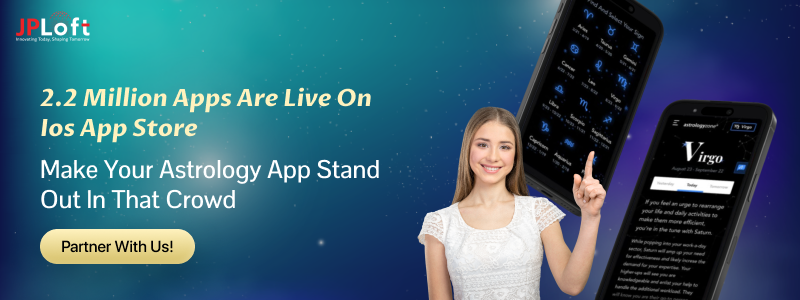
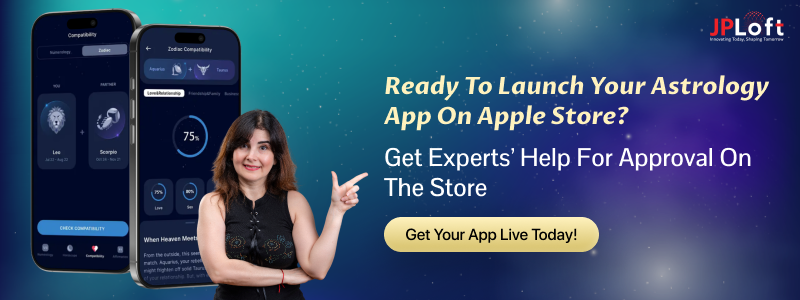

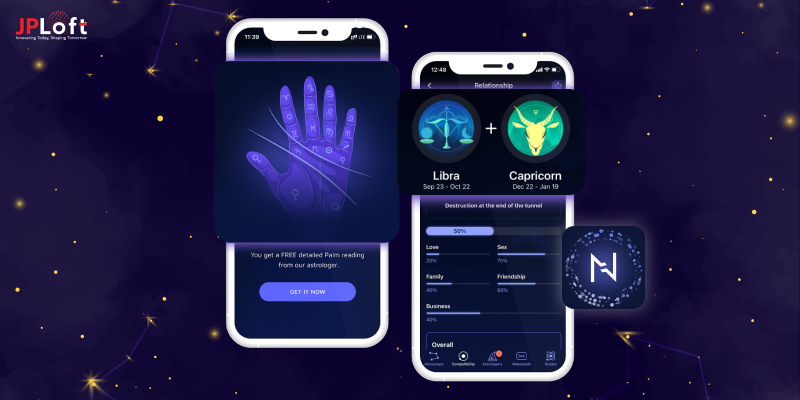
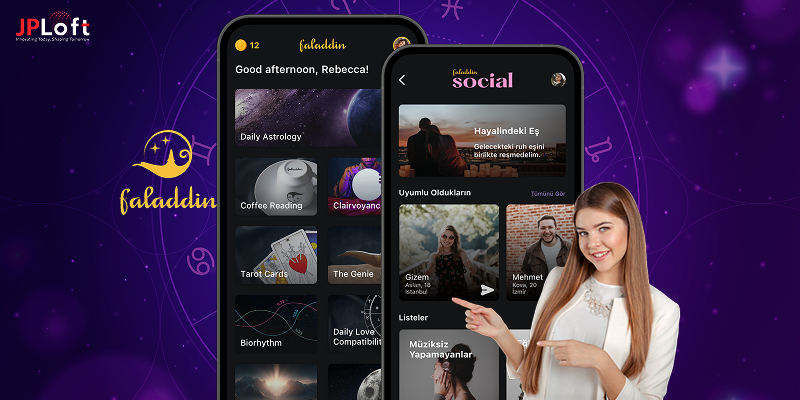
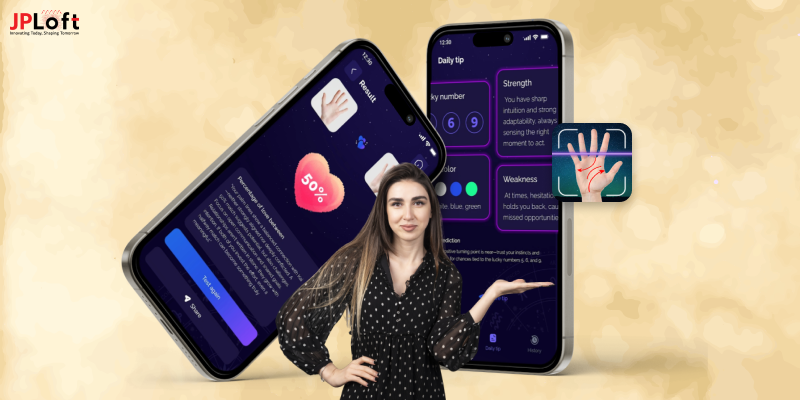


Share this blog